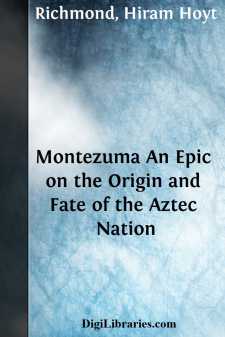Categories
- Antiques & Collectibles 13
- Architecture 36
- Art 48
- Bibles 22
- Biography & Autobiography 813
- Body, Mind & Spirit 142
- Business & Economics 28
- Children's Books 17
- Children's Fiction 14
- Computers 4
- Cooking 94
- Crafts & Hobbies 4
- Drama 346
- Education 46
- Family & Relationships 57
- Fiction 11829
- Games 19
- Gardening 17
- Health & Fitness 34
- History 1377
- House & Home 1
- Humor 147
- Juvenile Fiction 1873
- Juvenile Nonfiction 202
- Language Arts & Disciplines 88
- Law 16
- Literary Collections 686
- Literary Criticism 179
- Mathematics 13
- Medical 41
- Music 40
- Nature 179
- Non-Classifiable 1768
- Performing Arts 7
- Periodicals 1453
- Philosophy 64
- Photography 2
- Poetry 896
- Political Science 203
- Psychology 42
- Reference 154
- Religion 513
- Science 126
- Self-Help 84
- Social Science 81
- Sports & Recreation 34
- Study Aids 3
- Technology & Engineering 59
- Transportation 23
- Travel 463
- True Crime 29
Montezuma An Epic on the Origin and Fate of the Aztec Nation
Description:
Excerpt
ARGUMENT OF THE POEM.
From the moment of my earliest acquaintance with Colonial History, I have felt all the pressure of a task laid upon me, tightening its grasp as I reached maturer years; that of an attempt to rescue the Aztecs from their letterless and mythical position in history, to the position which their possibilities at least argue for them; and this feeling has been far less the outgrowth of the enthusiasm awakened for the Aztecs, as the indignation felt at the whole conduct of the Spanish Conquest.
Realizing the gravity of the task, I have been led to carefully weigh and investigate the different theories advanced as to the origin of the Aztecs, and to adopt the argument of the poem as the best ground on which to unite the Sun Worship of the East with the Mythology of of the West.
Reverently, and with a full realization of how great must ever be the distance between the actual work and the ideal of my early inspiration, I lay the gathered chaplet at the shrine of old Chapultepec, and only regret that the fruiting should have fallen so far short of the promise of its blooming.
To Hubert Howe Bancroft the living, and W. H. Prescott the dead, differing as they do in some very material respects, yet essentially the same in spirit, I wish to record my indebtedness for their admirable and exhaustive works that have induced to a final effort the poem of which this is prefatory.
Some years since, I found in an abridged history of the United States, a brief outline that led me back to the Dispersal at Shinar (certainly a safe location for a speculative beginning) for the origin of the Aztec race.
It occurs to me now, with a shade of the ludicrous, that if safety were the all-important thing in the premises, I might have gone back a step farther to the figs and pomegranites of Eden, and prayed for the shade of Adam to cover the exotic which I have humbly tried to rescue from what seems to me to be an obscurity. The careful analogies drawn between Egypt and the Aztecs by both Prescott and Bancroft could be better met by locating the origin at Shinar than at any other point, as it takes us back to a date where we may consistently locate the Shepherd Kings and the overrunning of Mizraim by them, a part of Egypt's early history which is outlined (more or less briefly) by nearly all early
As to the initial period of Sun Worship and its origin, I could of necessity have but little aid, and if I have seemed a little too speculative, I have only this apology: The prodigy of Egypt's prehistoric development, and the manufacture of glass, antedating historic research. It needs no great imaginative tension to crown some incipient philosopher not only with the discovery of glass, but, that in its proper shape, it could be made to concentrate the solar rays, and produce fire; and at that day and age, what possible superstitions might result from these discoveries!
After the re-establishment of the Mizraim descent, and the consequent expulsion of the "Sons of Lud," the line of their journey is the natural outgrowth of their religious fanaticism....


